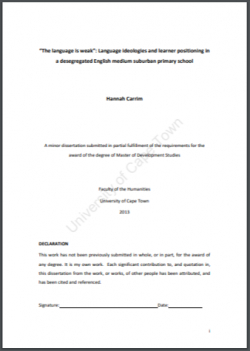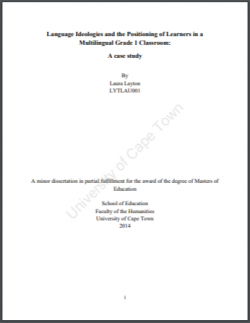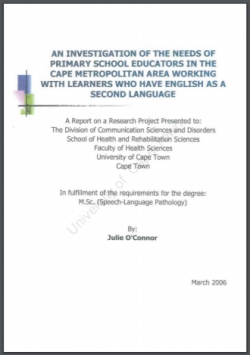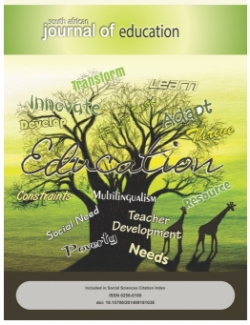The language is weak : language ideologies and learner positioning in a desegregated English medium suburban primary school

Type
Thesis
Authors
Category
ECCE, Foundation
[ Browse Items ]
Publication Year
2013
Publisher
URL
[ private ]
Pages
105 p.
Subject
Early childhood education, Primary education, Foundation Phase, Inclusive education, Learners, Teachers, English language instruction, Second language speakers, Xhosa language, Language ideologies, Racism, Desegregated schooling, South Africa
Tags
Abstract
Despite the multilingual resources of the majority of South African learners, schools in South Africa have shown an increasing trend towards English medium of instruction from the onset of formal education. This trend has resulted in many learners being expected to access the curriculum through an additional language. Important questions are thus raised about how the multilingual resources of learners are viewed within the education system, and the discourses that are (re)produced about English language learners in English medium schools. This research therefore sets out as a small-scale case study to explore the language ideologies (Woolard 1992) in the foundation phase of a suburban, desegregated, English medium school, Southern Junior (SJ), attended by a majority of mother tongue Xhosa speaking learners. The data was collected over a one-month period and included interview material with eight members of teaching staff and field notes and video footage from ethnographic classroom observations of ‘teaching as usual’ (Davies & Hunt 1994). A particular focus was on the discursive practices of a teacher and language aide in a Grade 1 class. The data was then analysed with reference to post-structuralist discourse analysis (Baxter 2002). Bourdieu (1977) and Blommaert (2010) were drawn on to explore the ways in which discourses about language are (re)produced and become (il)legitimate in this setting. Particularly, the focus of data analysis is on the power dimensions inherent in the language ideologies circulating at SJ, and the ways in which this environment enables and disables language resources in a context of multilingualism. In relation to this focus on language, I address questions about race, assimilation and the negotiation of difference in desegregated schooling (Soudien 2004; Sayed & Soudien 2003; McKinney 2007; Makoe 2007) and the ways in which teachers position learners in light of this (Davies & Hunt 1994). The study revealed the deficit positioning of learners by teachers in reference to monoglot English linguistic ideologies highly interlinked with racial stereotypes that privilege white ways of knowing and being. The data showed that English, and a particular variety of White South African English, is the linguistic capital at SJ while the mother tongue Xhosa linguistic repertoires that learners bring with them from home are devalued. The points of rupture to the dominant ideologies observed in the Grade 1 language aide’s use of both English and Xhosa to facilitate learning were then analysed with reference to Gutierrez’ (2008) theorisations of hybrid literacy practices and the ‘third space’ in classrooms.
Description
Thesis (MPhil (Development Studies))--University of Cape Town, 2013
Number of Copies
1
| Library | Accession No | Call No | Copy No | Edition | Location | Availability |
|---|---|---|---|---|---|---|
| Main | 922 | 1 | Yes |



